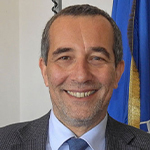Paolo Mancarella was born in Gallarate (Varese) on 8th November 1959. He graduated in Computer Science at the University of Pisa in 1982 and gained a joint Ph.D. in Information Technology from the Universities of Genoa, Pisa and Udine in 1988. After a period at the Imperial College of Science in London, he returned to the University of Pisa initially as a researcher, then associate professor and finally from 2004 as a full professor in the Department of Computer Science.
During his career, Professor Mancarella has covered numerous important institutional roles both within the University of Pisa and at national level. He was Deputy Head of the Faculty of Mathematics, Physics and Natural Sciences from 2006 to 2010 and Vice Rector to Teaching from 2010 to 2016. From 1999 to 2016, he was the Rector’s Delegate in the function of coordination, supervision and support of all those activities concerning the integration of students with disabilities. He was also Head of the Unit for the support and integration of students with disabilities (USID). Between 2009 and 2015, he was President of the National University Conference for Disability Delegates (CNUDD).
Professor Mancarella’s teaching activities have been mainly within the field of the core learning activities for the degrees in Computer Science and Informatics. He was Head of the Operative Unit of the Department of Computer Science for two regional projects aimed at developing multimedia learning centres and the use of innovative teleformation methodologies for staff training.
On the research side, Professor Mancarella started from the analysis of the declarative programming language for knowledge representation. He then expanded his interest to the broader theme of computational logic, studying innovative models and language for intelligent systems based on logic, able to endow artificial systems with a capacity for reasoning which is not only deductive but also hypothetical and predictive. In more recent years, his research has been aimed at the so-called logic-based argumentation systems through studies of a theoretical and foundational nature, but with an emphasis still on the computational and applicative aspects. These were central themes in two European projects: SOCS (SOcieties of ComputeeS, 5TH Framework Program, 2002-2004) and ARGUGRID (ARGUmentation as a foundation for the semantic GRID, 6th Framework Program, 2006-2009).
Other research themes developed by Paolo Mancarella are concerned with the static analysis of concurrent languages, temporal reasoning, the integration of functional and logic programming paradigms and the development of prediction systems for people with disabilities.

